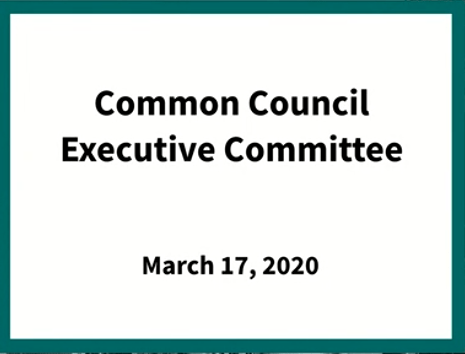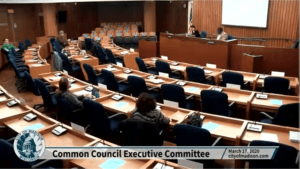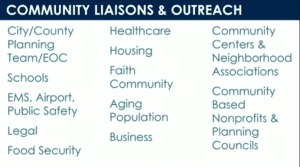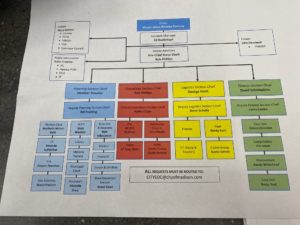This will just be the highlights of what the alders learn as it is being live blogged.You can watch along here
STARTING THE MEETING
There is a delay in getting started, meeting should have started at 4:30.
They are in the council chambers, spaced out amount the chairs in room 201 in the City County Building, the regular council chambers.
They approve the minutes, there are no disclosures or recusals. They take care of some other things first
Elimination of Committee on the Environment – The pass it on a voice vote with no discussion. The Committee on the Environment has no recommendation because they cancelled their meetings for January, February and March.
Water Utility Financial Audit – They pass is on a voice vote with no discussion.
They recess until 5pm.
UPDATE FROM PUBLIC HEALTH AND OTHERS
Alders are joining them in room 354 through livestreaming, they will be able to take questions if they are emailed to the council president and she will read the questions out loud. They will have presentations and then they will take questions.
Dr. Nasia Safdar, Medical Director of Infection Control, UW Health
We are in the throes of a pandemic, and the question is what we can do to flatten the curve. It’s spread like influenza, that is why social distancing is important, the droplets will drop to the ground. There is some evidence that people without symptoms can spread it. 80% will have respiratory issues, aches and fever. Some will recover and never know that they had it. Older people and people with underlying conditions and the health system workers are the main concern. In the beginning there was wide-spread testing, because we were trying to figure out the extent of the problem. The immediate need to know if someone has it is less, especially those with mild symptoms. They need to know for people entering the health care system so they can treat them appropriately. There is no cure for the coronavirus. Health care workers are risky because they are front line workers, they need the gowns, gloves, masks and other supplies they need. Those supplies are in high demand. They are trying to preserve those for the health care system. As workers become ill, there is a shortage of workers. Self isolation with those with mild symptoms, social distancing and focusing on health care workers is the key.
Janel Heinrich, Director, Public Health Madison & Dane County
She has a powerpoint. They have a 160 person staff, 90 of them are activated to support the health department response. They started that on January 21st, before the first case. All of the work they are doing is to flatten the curve. They are monitoring the person who has the virus, they were monitoring travelers but now that there is community wide spread and they are working with people who are being tested and those with the virus. We have 18 people with the virus and the only person in the state who has recovered. They have a network diagram that shows the potential spread of the illness in the community. It will help them identify the cluster that may identify. Community transmission with no known source is what they discovered yesterday, with no travel. They are working with community liaisons and outreach to different sectors and partners.
They are using their powers to restrict and enforce social distancing. To keep people away from each other, keep the vulnerable populations safe. They are also working on getting information out, they are asking everyone to route them back to the information from public health. They are trying to provide it in other languages but can only guarantee english and spanish. The information is changing too quickly to translate into other languages.
Fire Chief Steven Davis
The cities Emergency Operation Center (EOC) has been around since 2004 (?) – basically people take on additional responsibilities to help solve issues. The current EOC model was handed out. They started with the model when the first case was identified. The full model is up and running as of 8am this morning. This will likely be a two year event. The rebuilding will come in to play at some point, businesses will have to reopen and staff have to get back to work.
Heather Stouder is the Planning Section Chief. As agencies have issues they send it to one place, the triage officers are Ed Ruckreigel, himself and Rob Phillips. They have 29 requests as of this morning, about half went to planning. Heather pulls together teams to work on the issues. They will have to expand that. Rob Phillips is the Operations Manager for several departments. George Hank is Logistics, he works on supplies. Dave Schmiedicke is in finance and Laura Larson is helping. The Mayor is in charge of it all and is really working hard. Mary Botari is the liaison. Katy Crowley is running the Joint Information Center. In the flood response that was the busiest. He had heard we have been slow to respond on some issues, but the information is changing so quickly that it changes it before it can get out. As part of the JIC there are many involved. Ed Ruckreigel is the Emergency Management Manager. John Housbeck is also helping from Public Health. He says there is more detail, every agency in the city is behind this. This is going to be a long haul. This is not going to go away in April, May, June or July.
Here’s the hand out
Mayor Satya Rhodes Conway
Mayor says we have been working on this since Mid- to Late-January, but things are moving very fast. They are keeping the Council President and Council Chief of Staff in the loop and share information as they have it. She asks for patience and forgiveness if they don’t’ share things directly with the council, but it comes through staff or Council President. She thanks the Chief and staff for their work. They are working long hours and over weekend, but the stress is adding up – particularly for IT, Clerk and Public Health. She asks for patience and to hold off on anything not related to the virus. She asks people to look at what is already put out, check both the internal and external site. Be patient, they are doing a good job of triaging, but your item may not be on the top.
Internal steps they have taken are
- Guidance on internal meetings, they are asking people to do them over the phone or electronically where possible. In line with the governor’s guidance, no meetings over 10 people. Practice social distancing if they do meet face to face.
- The vast majority of services are continuing – police fire and streets are being delivered as usual – other services are over the phone, email and on-line. Many services are closed to walk up – the exceptions are clerk, police and treasurer. People can still early vote. They expect the election to go as scheduled. They are asking people to vote early or absentee. They are working on getting word out about how to access services – check website and facebook.
- Many staff are teleworking. Others are at work and doing agressive social distancing and cleaning. Some staff who can’t work remotely and if their work isn’t essential or not shut down, they may be re-tasked to help with other tasks (planning, elections, public health, etc) As some services like the libraries or Warner Park are shut down, they will not be without pay. They will be put on administrative leave or be reassigned.
- All staff will be getting 2 weeks of leave, they are also allowing people to access the leave they will earn over the course of the year. They want anyone who might be symptomatic (with anything) can stay home without worrying. Or if they need to stay home with a family member or need a respite day. They won’t be without pay, last resort is administrative leave.
- They will talk about the council and committee meetings tonight. They should be able to have remote meetings starting at the 31st council meeting. The planning section is working hard on solving different needs. Some include:
- Food and food access: anyone signed up to have a senior meal at a meal site will get delivery instead of in person, that is thanks to SSM Health. Schools are offering meal pick up. Food pantries are organized with each other and the federal government to keep the food delivery safe. They realize that more and more people will become food insecure as this going on.
- Homeless: They are working on risk prevention in shelters, they are working on places for those most vulnerable to the virus to be out of the shelter. They are working on adding capacity to practice social distancing. They are also working on a health screening and isolation options if they are symptomatic.
- Childcare: One of the top priorities is making sure the hospitals can continue to function – there are complications around staffing getting to work. We are working on childcare options for the health care and essential service workers at the city. This is a collaborative effort across agencies and institutions.
- Seniors: They are higher risk and the centers are closed. Meal delivery is happening. They are working on remote activities and drop off of materials – to provide community and interaction. There is a positive health benefit of isolating, but it can have an impact on mental health.
- Eviction and paid sick leave: The city is pre-empted from putting a moratorium on evictions or requiring paid sick leave in the public sector. The state could do that, it’s not in our power. She hopes they do.
- Volunteers: Send them to coordinate with United Way.
- Funds: There are several funds established that are out there and may be a resource in the future. (She can’t say more because of ethics rules – which she already violated in earlier press conference)
- City Website/Communications: There is a page that is their response to COVID 19 – direct people there for better information. They are doing a daily blog that focuses on different aspects of the city response. She thanks the alders that are sharing information through their blogs.
She says this is a marathon, not a sprint – while they are focused on essential services, health care, those who are vulnerable and/or were vulnerable before this. But, they also have to start looking towards recovery and adding back the regular functions. All policy priorities are on hold. Many city staff have dropped all other work – that is totally appropriate right now. But at some point they need to return to the work that they do. Particularly bringing back the committees and getting back to business. This is going to reshape our economy and our entire city. We need to think about that. We need you to share concerns and good ideas now, but we need you to think about long term planning for recovery most of all. She thinks that is something that the council is particularly suited to doing. Think what we will be in 6 months, 1 year or more from now. Take care of yourselves, take care of each other, practice good hand hygiene, social distancing and drink lots of water. We need to keep ourselves well and functioning for the long term.
QUESTIONS
Grant Foster is asking about PPE (protective gear) for workers, esp. Metro drivers.
Mayor says the best guidance is that we all need to reserve PPE for health care, that is the most important place we need it. The most effective use of masks is for people who are symptomatic. They are not for prevention strategies. We have some, but we are thinking about how to best use those. They are looking at social distancing for on buses and they should have details any moment.
Grant Foster asks about emergency related expenses won’t fall under expenditure restraint.
Mayor says that they sent out information about how to track expenses related to the virus to all department heads. They are tracking what state and federal funds might be availalbe for the city and for the community as a whole.
Arvina Martin asks about plans for if this gets really bad, what are the plans in place for wartime triage type situations.
Mayor says that planning is underway.
UW Doctor says that they want to be as prepared as possible, this will be a collective effort at a national scale. That sort of coordination will be unprecedented. Other countries have had shortage of items, like in Italy. We have an opportunity to pre-empt that. We don’t have that national coordination yet, but she hopes they will get behind it.
Sheri Carter asks about keeping childcare facilities open.
Mayor says that the governors order does that, for essential workers.
Carter asks about a call center if people have questions.
Mayor says public health has a call center for questions, but if you are sick CALL your provider, don’t go in.
Carter asks about re-tasking employees – would they go there.
Mayor says yes.
Carter asks if we are getting the information to the employees who paint picnic tables, how do people who work away from computers get information.
Mayor says its imperfect, all communications asks departments to share with people who don’t use emails. Departments have developed systems for that.
Carter asks if the EOC is at the Water Department.
Mayor says it is virtual because of social distancing.
Tag Evers asks about capacity in the health care system, can other states send their workers?
UW Doctor says they are looking at trainees and focusing more locally. They are putting people to work.
Evers asks about empty dorm rooms, will they be used.
UW Doctor says that they have to look at those who need care and those who need ICU care. Perhaps that would be a way to get people care.
Evers asks about the homeless population and facilities.
The mayor kind of cuts him off and says yes, they are looking at facilities, but they need ti for testing, childcare, homeless, health care patients, food storage and more. So, the challenge is to assess the needs and the available facilities and find the best match. If someone needs acute care there are limited options. Child care is easier to stand up in some places than others. They are looking at the needs and capacity.
Evers asks about an extension on property taxes for the next installment until they get their checks from the federal government.
Dave Schmiedicke, Finance Director says its is a state law requirement and they are researching if they can do that at the local level, or if it needs and administrative action of the Department of Revenue.
Alder in remote location asks about testing stations.
UW Doctor says that is a specimen collecting place, the value is for the health care workers so they can be brought back to work when feeling better. Some patients need to be tested, but the community doesn’t need wholesale testing.
Public Health Director agrees. Something will be happening based on the needs.
Alder Rummel asks what administrative leave entails.
Mayor says every employee gets two weeks emergency leave, but if placed on administrative leave, where their facility or job is shut down and we can’t re-task them, we would place them on administrative leave, which means sending home but continuing to pay them.
Alder asks about early voting, is it only at City Clerk.
Mayor says she believes there may be some other locations. Follow them on twitter to see how many absentee ballots they have. She reminds them that they should early vote or vote absentee.
Alder asks about Metro workers and hand sanitizer on the buses.
Mayor doesn’t know the answer, but they wil run it through the EOC structure, they have a whole section on logistics.
Another alder asks about “getting ahead” of the Metro director, do you want the staff to hear first?
Yes, they are working on several things.
Alder Rohrer asks about how City is working with UW about students who went on spring break and will return, possibly with the virus.
Mayor says they have weekly meetings. Also with other systems. They are convening regularly with the top decision makers in other institutions.
And . . . my computer froze . . . brb.
Er, I guess
Will finish when I can get the audio.
Hmmm. . . or if it comes back on line
It may have to wait until after the council meeting. I’ll be live blogging that as well.













